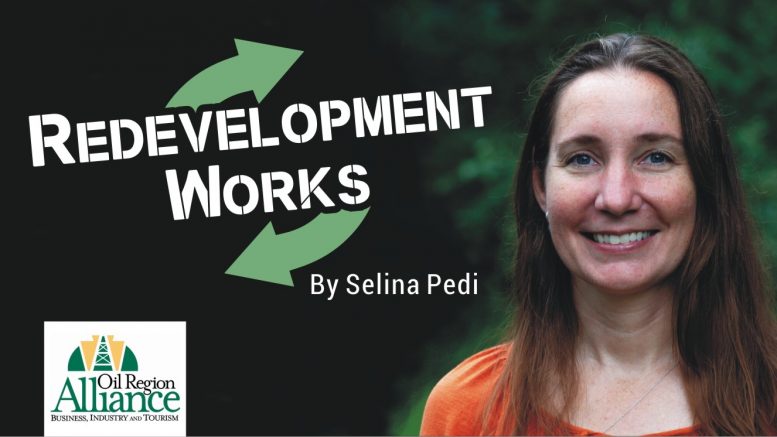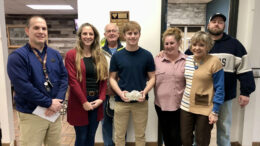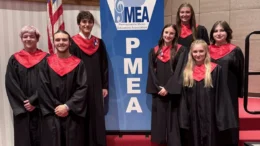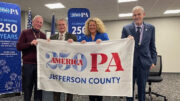
Decades of exposure to graphite lubricant have created a tricky clean-up situation at the former Fuchs facility. (By Natalie McCarthy)
We’ve been talking a fair bit about the theory of redevelopment – what it’s about and what sorts of activities it can entail. Today, though, I’d like to focus on the practical side of redevelopment: what it will actually be doing in one of our towns.
You may remember that we kicked off our first major redevelopment project at the start of November, our three-year, EPA-funded, community-wide brownfield project. This project is looking at brownfields stretching from Parker to Oil City, assessing the environmental risks of each site and coming up with plans to clean them up and get them back into productive use. A primary focus for this grant is the former Quaker State and Fuchs Lubricants complex at the edge of Emlenton. For our readers who do not live in Emlenton, a bit of background.
The former Quaker State refinery and the former Fuchs Lubricants facility make up a 53-acre brownfield complex running along the entire western edge of Emlenton, and comprising a full half of the town’s river frontage. The site had been in industrial use since the 1800s, playing host to barge landings, railyards, mills, workshops, as well as oil wells and refineries. The site was an integral part of the community for more than a century, with multiple generations employed by companies like Quaker State and Fuchs. However, after several decades of diminishing local oil production and shifting markets, the Quaker State facility was downgraded in the 1980s and ultimately decommissioned in 2000, and Fuchs followed suit in 2012. Most of the buildings, tanks, and pipes were removed in the early 2000s, and native vegetation has begun to reclaim the site. Today, only two buildings remain – the original Fuchs laboratory and workshop, and the Quaker State administrative block – both of which are in disrepair and in need of either demolition or serious renovation.
The focus of redevelopment for this complex, which serves as a local trailhead for the Erie-to-Pittsburgh bike trail network, is to clean up any remaining contamination and open the site up for public use. Plans include recreational amenities such as improved trailhead access and parking, a new public boat launch, picnic area, playground, and trails. The site has potential for educational and commercial development, too, especially on the Fuchs portion of the complex, which is right at the edge of downtown Emlenton and serves as a link between the town and the trail. A multi-use space is envisioned, where the ORA can help locals realize their entrepreneurial dreams in hospitality, outdoor recreation, arts and culture, local food systems, and renewable energy.
There is a lot of work ahead of us, starting with a thorough and unbiased regional market analysis – so that any plans we make as a community are based on reliable data and realistic expectations – and then a continual process of discussion, research, prioritization, experimentation, and adaptation. This is redevelopment in action. This is our future, and it’s starting right now!
Selina Pedi is the Oil Region Alliance redevelopment manager. She can be reached by email at spedi@oilregion.org.

































